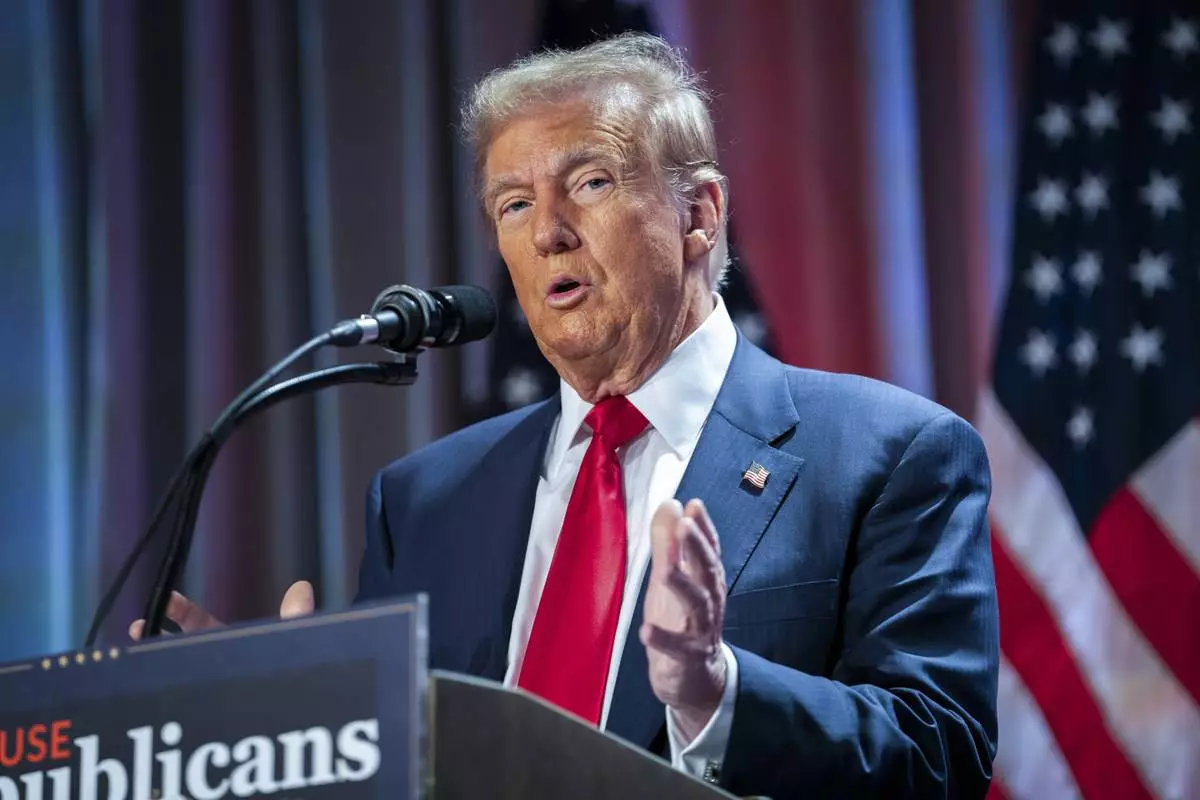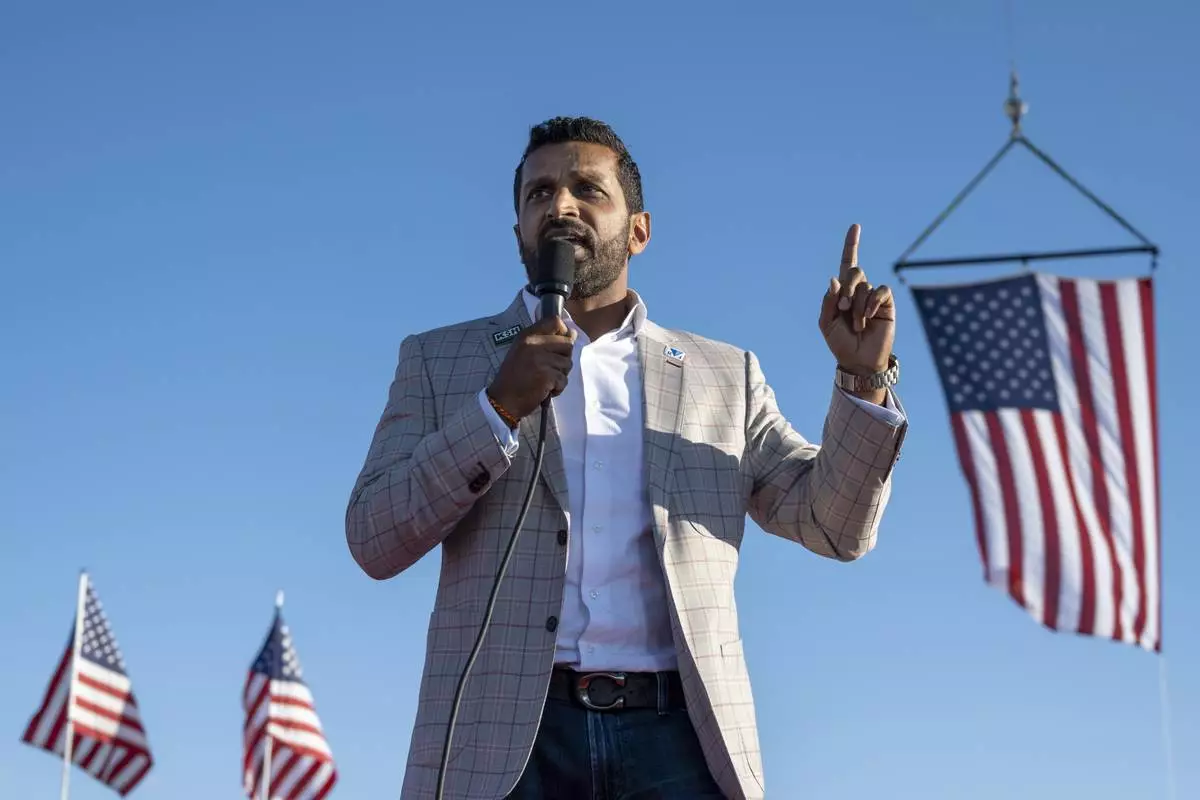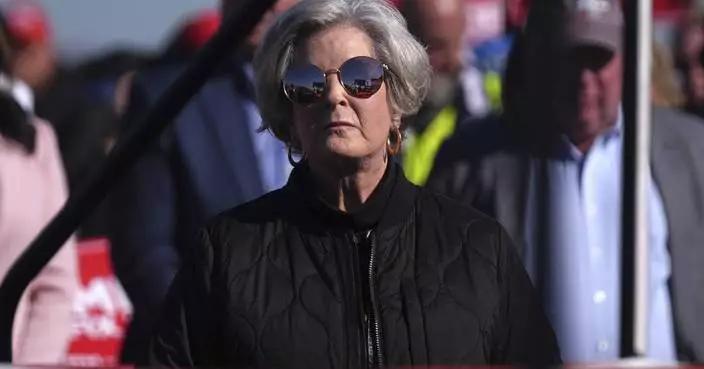SYRACUSE, N.Y. (AP) — Kyle McCord and Syracuse knocked No. 6 Miami out of Atlantic Coast Conference title contention — and possibly ended the Hurricanes' College Football Playoff hopes — by rallying from a 21-0 deficit for a 42-38 win on Saturday.
McCord threw for 380 yards and three touchdowns for the Orange (9-3, 5-3). LeQuint Allen ran for two scores and picked up two critical first downs on Syracuse’s final, clock-killing drive, and Devin Grant forced a fumble that he returned 56 yards for a touchdown to help the Orange beat a ranked foe for the third time this season.
“I want to be the one who brought (Syracuse football) back to what it once was,” said McCord, who transferred from Ohio State after starting for the Buckeyes last season. “That’s a testament to this team. This win shows that Syracuse is for real and being part of that team that turned things around, that’s going to last forever. Looking back, everything (coach Fran Brown) said came true and coming here is the best decision I’ve made in my life.”
Cam Ward had 349 yards passing with two touchdowns for the Hurricanes (10-2, 6-2, No. 6 CFP), who will be off next week while Clemson faces SMU for the ACC title and will have to hope for an at-large bid into the 12-team playoff.
“If we get a chance to go into the playoff, we’re going to make the most of it,” Ward said.
Miami had little trouble scoring but settled for a field goal on what turned out to be its final possession when coach Mario Cristobal declined to go for it on fourth-and-goal from the 10.
“We use analytics. It was outside the 10-yard line with four minutes to go. Get the points. Get a stop,” Cristobal said.
The Hurricanes didn't get that stop. Syracuse ran the ball eight times to run out the final 3:42, aided by an offside penalty.
Miami had defeated Syracuse six straight times before this shootout, in which the teams combined for 983 yards of offense and 51 first downs. The Hurricanes began the season 9-0 but have lost two of three, falling three weeks ago at Georgia Tech.
“We came up short and that’s on all of us, starting with myself,” Cristobal said. “We don’t shy away from it. We’re not in any way, shape or form anything but hard workers and accountable people. And it’s brutally difficult.”
McCord was 26 of 36 and became the first Syracuse quarterback to throw for 4,000 yards in a season. His second touchdown pass to Jackson Meeks was his 27th of the season, also an Orange record.
McCord couldn't resist a dig at his old school after the second-ranked Buckeyes scored just 10 points in a loss to unranked Michigan earlier Saturday.
“Everything comes full circle,” he said.
Allen finished with 143 yards from scrimmage for Syracuse — 22 carries for 82 yards and six receptions for 61 yards. Trebor Pena had six catches for 128 yards and a touchdown, and Meeks had seven catches for 110 yards and the two scores.
“They made contested catches 80, 90 percent of the time,” Cristobal said. “We had a difficult time covering them. The ball was out quick. We affected (McCord) early but didn’t affect him much as it went on.”
The game was tied at 28 when Grant forced a fumble by receiver Xavier Restrepo at the Syracuse 44. He scooped the ball and ran down the left sideline for the score, giving the Orange a 35-28 lead with 1:47 to go in the third quarter.
“We do it in practice,” Grant said. “The ball is the program. You punch at the ball. I was grateful for it to come out and was fortunate to take it to the house.”
Damien Martinez ran for a 2-yard TD on Miami's next possession to tie the game at 35-all. Allen's 3-yard run gave the Orange the lead for good at 42-35.
Restrepo finished with 148 yards receiving on nine catches for the Hurricanes, and Jacolby George had six receptions for 121 yards.
Miami scored touchdowns on its first three possessions and a rout appeared possible. A 40-yard touchdown pass from McCord to Pena midway through the first quarter was wiped out by an illegal formation penalty and seemed to deflate Syracuse.
The Hurricanes dominated the first 15 minutes, outgaining Syracuse 189 yards to 42.
"We gave them 21 points. There were a lot of self-inflicted wounds,” said Brown, the Orange's first-year coach. “I think we were just tested again, about how tough we were and our will. I think the 21-0 (deficit) showed we won’t quit and that we’ll continue to push.”
The Orange began their rally with two quick touchdowns in the second quarter. Allen took a handoff, bounced off a would-be tackler and maintained his balance for an 8-yard TD, and McCord connected with Meeks in the left corner of the end zone from 9 yards out to make it 21-14 at the half.
The scoring didn't slow down after halftime.
A 25-yard pass to Pena in the right corner of the end zone tied the game briefly at 21 with less than a minute to go in the third, but the Hurricanes countered three minutes later on Mark Fletcher Jr.’s second 2-yard score of the game. McCord and Meeks tied it at 28-all when they hooked up for another 9-yard TD.
Miami must clean up its defense, and given the struggles on that side of the ball, Cristobal will be second-guessed for kicking the short field goal late.
McCord and Syracuse showed tremendous fight and resilience.
Miami awaits a playoff berth or a bowl game. The Orange await their bowl game destination and opponent.
Get poll alerts and updates on the AP Top 25 throughout the season. Sign up here. AP college football: https://apnews.com/hub/ap-top-25-college-football-poll and https://apnews.com/hub/college-football

Miami wide receiver Xavier Restrepo (7) dives for the pylon to score while defended by Syracuse defensive back Devin Grant (23) during the first half of an NCAA football game Saturday, Nov. 30, 2024, in Syracuse, N.Y. (AP Photo/Adrian Kraus)
WASHINGTON (AP) — President-elect Donald Trump says he will nominate Kash Patel to serve as FBI director, turning to a fierce ally to upend America’s premier law enforcement agency and rid the government of perceived “conspirators.” It’s the latest bombshell Trump has thrown at the Washington establishment and a test for how far Senate Republicans will go in confirming his nominees.
The selection is in keeping with Trump's view that the government's law enforcement and intelligence agencies require a radical transformation and his stated desire for retribution against supposed adversaries. It shows how Trump, still fuming over years of federal investigations that shadowed his first administration and later led to his indictment, is moving to place atop the FBI and Justice Department close allies he believes will protect rather than scrutinize him.
Patel “played a pivotal role in uncovering the Russia, Russia, Russia Hoax, standing as an advocate for truth, accountability, and the Constitution,” Trump wrote Saturday night in a social media post.
The announcement means current FBI director Christopher Wray must either resign or be fired after Trump takes office on Jan. 20. Wray had previously been named by Trump and began the 10-year term — a length meant to insulate the agency from the political influence of changing administrations — in 2017, after Trump fired his predecessor, James Comey.
The decision sets up what’s likely to be an explosive confirmation battle in the Senate not long after Trump’s first pick to lead the Justice Department, Matt Gaetz, withdrew his nomination amid intense scrutiny over sex trafficking allegations. Patel is a lesser-known figure, but his nomination was still expected to cause shockwaves. He's embraced Trump’s rhetoric about a “deep state,” called for a “comprehensive housecleaning” of government workers who are disloyal to Trump and has referred to journalists as traitors, promising to try to prosecute some reporters.
Trump’s nominees will have allies in what will be a Republican-controlled Senate next year, but his picks are not certain of confirmation. With a slim majority, Republicans can only lose a few defectors in the face of expected unified Democratic opposition — though as vice president, JD Vance would be able to break any tie votes.
But the president-elect had also raised the prospect of pushing his selections through without Senate approval using a congressional loophole that allows him to make appointments when the Senate is not in session.
Wray fell out of favor with the president and his allies. His removal isn’t unexpected given Trump’s long-running public criticism of him and the FBI, particularly in the aftermath of federal investigations — and an FBI search of his Mar-a-Lago estate for classified documents two years ago — that resulted in indictments that are now poised to evaporate.
In his final months in office, Trump unsuccessfully pushed the idea of installing Patel as the deputy director at either the FBI or CIA in an effort to strengthen the president’s control of the intelligence community. William Barr, Trump’s attorney general, wrote in his memoir that he told then-chief of staff Mark Meadows that an appointment to Patel as deputy FBI director would happen “over my dead body.”
“Patel had virtually no experience that would qualify him to serve at the highest level of the world’s preeminent law enforcement agency,” Barr wrote.
Patel’s past proposals, if carried out, would lead to convulsive change for an agency tasked not only with investigating violations of federal law but also protecting the country from terrorist attacks, foreign espionage and other threats.
He's called for dramatically reducing the agency's footprint, a perspective that sets him apart from earlier directors who have sought additional resources for the bureau, and has suggested closing down the bureau's headquarters in Washington and “reopen it the next day as a museum of the deep state” — Trump's pejorative catch-all for the federal bureaucracy.
And though the Justice Department in 2021 halted the practice of secretly seizing reporters' phone records during leak investigations, Patel has said he intends to aggressively hunt down government officials who leak information to reporters and change the law to make it easier to sue journalists.
During an interview with Steve Bannon last December, Patel said he and others “will go out and find the conspirators not just in government but in the media.”
"We’re going to come after the people in the media who lied about American citizens who helped Joe Biden rig presidential elections,” Patel said, referring to the 2020 presidential election in which Biden, the Democratic challenger, defeated Trump. “We’re going to come after you, whether it’s criminally or civilly. We’ll figure that out. But yeah, we’re putting you all on notice.”
Trump also announced Saturday that he would nominate Sheriff Chad Chronister, the top law enforcement officer in Hillsborough County, Florida, to serve as the administrator of the Drug Enforcement Agency. He has worked closely with Trump's choice for attorney general, Pam Bondi.
Patel, the child of Indian immigrants and a former public defender, spent several years as a Justice Department prosecutor before catching the Trump administration's attention as a staffer for the House Permanent Select Committee on Intelligence.
The panel’s then-chairman, Rep. Devin Nunes, R-Calif., was a strong Trump ally who tasked Patel with running the committee’s investigation into Russian interference in the 2016 campaign. Patel ultimately helped author what became known as the “Nunes Memo,” a four-page report that detailed how it said the Justice Department had erred in obtaining a warrant to surveil a former Trump campaign volunteer. The memo’s release faced vehement opposition from Wray and the Justice Department, who warned that it would be reckless to disclose sensitive information.
A subsequent inspector general report identified significant problems with FBI surveillance during the Russia investigation, but also found no evidence that the FBI had acted with partisan motives in conducting the probe and said there had been a legitimate basis to open the inquiry.
The Russia investigation fueled Patel's suspicions of the FBI, the intelligence community and also the media, which he has called “the most powerful enemy the United States has ever seen.” Seizing on compliance errors in the FBI’s use of a spy program that officials say is vital for national security, Patel has accused the FBI of having “weaponized” its surveillance powers against innocent Americans.
Patel parlayed that work into influential administration roles on the National Security Council and later as chief of staff to acting Defense Secretary Christopher Miller.
He continued as a loyal Trump lieutenant even after he left office, accompanying the president-elect into court during his criminal trial in New York and asserting to reporters that Trump was the victim of a “constitutional circus.”
And he found himself entangled in Trump’s legal woes, appearing two years ago before a federal grand jury that investigated Trump’s hoarding of classified documents at his Mar-a-Lago estate in Florida.
Typically though not always, presidents retain the director they’ve inherited: Biden, for instance, kept Wray in place even though the director was named by Trump, and former President Barack Obama asked Robert Mueller to stay on an extra two years even though Mueller was tapped by Obama’s predecessor, George W. Bush.
Trump had openly flirted with firing Wray during his first term, taking issue with Wray’s emphasis on the election interference threat from Russia at a time when Trump was focusing on China. Wray also described antifa, an umbrella term for leftist militants, as an ideology rather than an organization, contradicting Trump, who wants to designate it as a terror group.
The low-key FBI director had been determined to bring stability to an institution riven by turbulence following the May 2017 firing of Comey by Trump amid an FBI investigation into potential ties between Russia and Trump’s 2016 campaign.
Wray sought to turn the page on some of the controversies of Comey’s tenure. The FBI, for instance, fired a lead agent from the Russia investigation who sent derogatory text messages about Trump during the course of the inquiry and sidelined a deputy director under Comey who was a key figure in the probe. Wray also announced dozens of corrective actions meant to prevent some of the surveillance abuses that tainted the Russia investigation.
The FBI has worked to protect Trump this year following multiple assassination attempts and disrupted an Iranian murder-for-hire plot targeting the president-elect that resulted in criminal charges unsealed in November.
Associated Press writer Jill Colvin in New York and Fatima Hussein in West Palm Beach, Florida, contributed to this report.

FILE - President-elect Donald Trump speaks during a meeting with the House GOP conference, Nov. 13, 2024, in Washington. (Allison Robbert/Pool via AP, File)

FILE - Kash Patel, former chief of staff to Acting Secretary of Defense Christopher Miller, speaks at a rally in Minden, Nev., Oct. 8, 2022. (AP Photo/José Luis Villegas, File)












